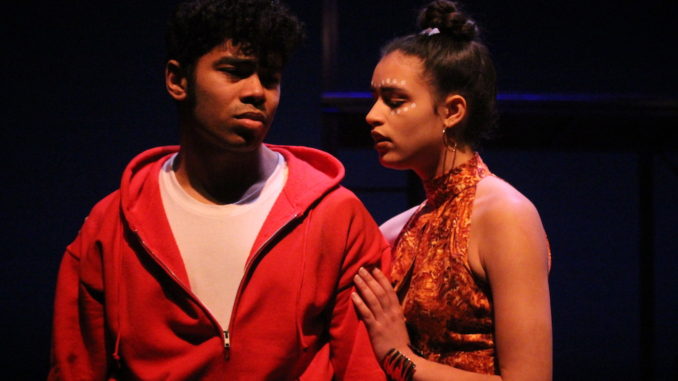
By Caitlin Chappell
Greek legends are often reimagined to fit new audiences. From the Amazons in Patty Jenkins’ “Wonder Woman,” to the retelling of “Lysistrata” in Spike Lee’s “Chiraq,” artists turn to these legends to create contemporary work. Naomi Iizuka’s play “Anon(ymous)” is one of these reimaginations brought to Lewis & Clark College for the Spring mainstage performance.
“Anon(ymous)” is a retelling of Homer’s “Odyssey” from the perspective of a young refugee trying to find his mother in the United States. While it pulls from the epic’s basic structure and themes, it resets the play in modern society and deals with contemporary issues surrounding race, community and home.
“It’s basically about a boy known as Anonymous, who goes through a series of events, showing what refugees experience today,” Hamdan Hamad Alameri ’18, the actor who played Ali and Ignacio, said. “Some scenes are more fiction. Some are more nonfiction.”
“Anon(ymous)” uses the magic of the “Odyssey” to represent refugee experiences; however, the play is not an exact reproduction of the epic. Characters have been changed, added and omitted. Some characters are left ambiguous so actors can relate more to them based on their own associations with home. This was the case for the character of Pascal, portrayed by Malavika Arun ’19.
“There isn’t a lot about (Pascal’s) history,” Arun said. “I wanted to work more on that, and I suddenly had a Pascal in my head that I wanted to bring out.”
For Arun, Alameri and the other actors, director Francisco Garcia encouraged them to answer questions about their characters’ histories on their own. The script may not have given the answers, but the actors were able to flesh out their characters by pulling from their own identities and their definitions of home.
In fact when it came to a lot of the characters, they were not defined by their counterparts in the “Odyssey.” Actors could look to the epic if they wanted to, but in the rehearsal space there was more of a focus on pulling from one’s own experiences in relation to what was written in the script. Despite these characters not being replicas of their Odyssey counterparts, the story of Anon is similar to Odysseus’.
“It’s the core of the ‘Odyssey,’ the hero’s journey home,” Oliva Mathews ’20, the actor who played Naja, said. “It’s following Anon through his journey home and finding what home means to him and what it means to the other people in the show. It’s about the people along the way.”
Those people, the ensemble, were a key part to LC’s production. While this was Anon’s journey, the other characters played a part in his journey and the man he became.
“Anon was this wandering soul to me that kind of became molded with the people he met, so he’s not necessarily this solidified character,” Avi Fana ’21, who played Anon, said. “After he’s interacted with all these different people, it finally molds him into this solid individual.”
Given how important relationships are in the play, the actors’ process included a lot of relationship-building exercises for characters as well as cast bonding. Some of these activities focused more on the characters while others focused on the actors getting to know each other beyond their roles.
“We started with a lot of getting to know each other and really identifying within ourselves what our idea of home was,” Mathews said. “That process was helpful in thinking through my character and helpful in getting to know the rest of the cast and identifying where we can relate to Anon’s journey, because Anon is supposed to be the everyman.”
It was not just up to Fava to understand Anon’s journey. Each character in the play either helped or hindered Anon’s journey home, so each actor needed to understand what “home” meant to their characters and themselves.
“We would sit and talk about home because that’s what this play is about, all these characters finding home and what that means,” Arun said. “I remember we all talked about home and what we liked most about home, and I remember for a lot of us home was specific people.”
Similar to Anon, the actors identified home as the people who played a part in their lives, rather than a specific location. For instance, Arun and Matthews both moved around throughout their lives, so home to them was the people they met along the way, including friends and family.
“What I appreciate and miss about home is the strong relationships within families,” Alameri said. “I feel like there is so much support between us.”
Anon became who he was because of everyone he met on his journey home. Similarly, this play became what it was because of the actors and crew who took part in it.
“I really do feel like I wouldn’t have been my character if it wasn’t for the people around me,” said Fana. “You can’t succeed without these people around you.”
Subscribe to the Mossy Log Newsletter
Stay up to date with the goings-on at Lewis & Clark! Get the top stories or your favorite section delivered to your inbox whenever we release a new issue.

Leave a Reply